|
|
|
Sort Order |
|
|
|
Items / Page
|
|
|
|
|
|
|
| Srl | Item |
| 1 |
ID:
137365
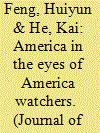

|
|
|
|
|
| Summary/Abstract |
Based on an original survey conducted in the summer of 2012 in Beijing, we examine how China's America watchers—IR scholars who work on US-China relations—have viewed China's power status in the international system, US-China relations and some specific US policies in Asia. Our survey shows that almost half of the survey participants thought that America would remain the global hegemon in the next ten years. Meanwhile, a large majority was also optimistic that China is a rising great power, especially in the economic sense, in the world. More than half of the respondents saw Asian military issues, such as the South China Sea issue, as the most difficult problem between China and the US.
|
|
|
|
|
|
|
|
|
|
|
|
|
|
|
|
| 2 |
ID:
187400


|
|
|
|
|
| Summary/Abstract |
Challenging a popular view that China’s rise will lead the United States and China to fall into the ‘Thucydides trap’—a possible hegemonic war between the two—this paper proposes an ‘institutional peace’ argument, suggesting that the ongoing international order transition will be different from previous order transitions in history. Instead of using military means to change the international order, China and the United States have relied on various institutional balancing strategies to compete with one another for an advantageous position in the future international order. The discussion on the institutional competition between China and the US around the AIIB and the ARF-related multilateral security architecture supports the ‘institutional peace’ argument: institutional competition in the form of institutional balancing strengthens the dynamics and utility of international institutions, encourages states to offer new public goods, and could lead to a more peaceful order transition in the international system. However, this institutional peace argument is constrained by two caveats: the continued validity of the MAD nuclear deterrence and a limited degree of ideological antagonism between the US and China.
|
|
|
|
|
|
|
|
|
|
|
|
|
|
|
|
| 3 |
ID:
133093
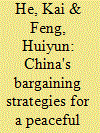

|
|
|
|
|
| Publication |
2014.
|
| Summary/Abstract |
Applying bargaining theory of international conflicts, we examine the successes and challenges of China's strategic choices in its ascent after the Cold War. We suggest that China needs to alleviate information and commitment problems in order to rise peacefully. Since 2008, China's "peaceful rise" strategy has faced serious challenges because of its "assertive turn" in diplomacy. We argue that China has not alleviated or settled these two problems successfully because of its ambiguous "core interest" diplomacy and undecided attitude regarding multilateral institutions in resolving the maritime disputes. China should engage in rule-based, institution building, such as a security community between China and ASEAN, to reinforce its peaceful rise commitments.
|
|
|
|
|
|
|
|
|
|
|
|
|
|
|
|
| 4 |
ID:
189319
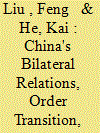

|
|
|
|
|
| Summary/Abstract |
The shifting balance of power and the growing strategic competition between China and the United States have accelerated the order transition in the international system. The nature and process of the order transition, peacefully or confrontationally, largely depend on how China interacts with the United States and other players in the region, especially Australia, Japan, and India. In this article, we introduce an "interest-threat nexus" model to shed some light on why China has formed different types of bilateral relations with key players in the region. We argue that China's bilateral relations are shaped by two perceptual factors: security threat and economic interest. While the threat perception shapes the "identity" feature of the bilateral relationship as partnership or rivalry, the "behavioral" feature of the relationship—cooperative or competitive in action—is largely influenced by the economic interests between the two countries. A systematic and nuanced analysis of China's bilateral relations with major regional players will help us to understand the changing dynamics of the order transition in the Indo Pacific.
|
|
|
|
|
|
|
|
|
|
|
|
|
|
|
|
| 5 |
ID:
165152
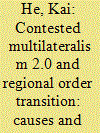

|
|
|
|
|
| Summary/Abstract |
This article proposes a new concept of ‘contested multilateralism 2.0’ to describe the puzzling institutional building efforts by non-ASEAN members after the 2008 global financial crisis (GFC) in the Asia-Pacific. It suggests that different to ‘multilateralism 1.0’ of the 1990s, which was mainly led by ASEAN, this wave of multilateralism has been initiated by other powers, such as the United States, China, Japan, Australia and South Korea, either by forming new institutions or by reinvigorating existing ones. This article advances an institutional balancing argument. It suggests that ‘contested multilateralism 2.0’ is a result of institutional balancing among major states under the conditions of high strategic uncertainty and high economic interdependence after the GFC. One unintended consequence may be that it could well lead to a more peaceful transformation of the regional order in the Asia-Pacific if regional security hotspots, such as the Korean crisis and the South China Sea dispute, can be managed appropriately.
|
|
|
|
|
|
|
|
|
|
|
|
|
|
|
|
| 6 |
ID:
189318
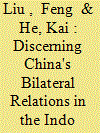

|
|
|
|
|
| Summary/Abstract |
The strategic competition between the United States and China has become a defining feature of international relations in the Indo Pacific. How China interacts with the United States and other major players in the Indo Pacific will shape the nature and process of the potential international order transition, either peacefully or confrontationally, into the future. This special feature systematically explores China's bilateral relations with five key players in the Indo Pacific, the United States, Japan, India, Australia, and ASEAN. By both theoretically unpacking bilateral relations between states and empirically examining China's strategic interactions with others in the region, this project aims to shed light on the complexity of China's bilateral relationships in the region. Each bilateral relationship is studied from both sides of the coin, i.e., by scholars from inside and outside China. This project explores the divergent perspectives between Chinese scholars and non-Chinese specialists on the same bilateral relationship in a pairwise fashion. The insights provided by this study will enrich our understanding of strategic dynamics during the period of potential order transition in the Indo Pacific against the background of U.S.-China strategic competition.
|
|
|
|
|
|
|
|
|
|
|
|
|
|
|
|
| 7 |
ID:
074748
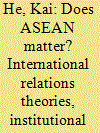

|
|
|
|
|
| Publication |
2006.
|
| Summary/Abstract |
The 1997 economic crisis and the ensuing political and social disorders not only have put regional security at stake, but also have seriously challenged the relevance of the Association of Southeast Asian Nations (ASEAN) in regional affairs. This article introduces a new institutional theory – institutional realism – to address the widely debated questions: Does ASEAN matter? If so, how? It argues that (1) ASEAN still matters in terms of coping with extra-regional threats through an institutional balancing strategy; (2) ASEAN's future depends on its institutional consolidation in dealing with intra-regional security problems.
|
|
|
|
|
|
|
|
|
|
|
|
|
|
|
|
| 8 |
ID:
085968
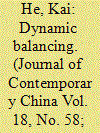

|
|
|
|
|
| Publication |
2009.
|
| Summary/Abstract |
This paper occupies a middle ground in the debate between regional area specialists in foreign policy analysis and international relations theorists in international studies. Based on balance of power and balance of threat theories, a 'dynamic balancing' model is introduced to explain states' foreign policy strategies. Its claims are: (1) the polarity of the international system shapes whether a state's strategic choices should be balancing with external efforts or balancing with internal efforts; (2) leaders' perceptions of external threats determine when and how a state pursues different balancing strategies. The application of the dynamic balancing model to China's balancing strategies towards the United States suggests that the future of Sino-American relations depends on the strategic interactions and mutual threat perceptions between the two nations.
|
|
|
|
|
|
|
|
|
|
|
|
|
|
|
|
| 9 |
ID:
183516
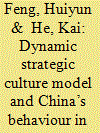

|
|
|
|
|
| Summary/Abstract |
This paper provides a new theoretical framework to explain China’s strategic behaviour along with its rise and in doing so engages with the debate on strategic culture between Colin Gray and Alastair Johnston. We suggest that China’s behaviour is shaped by two variables: realpolitik realist threat perceptions on the strategic level and Confucian moralist cultural norms on the ideational level. In the case of a high strategic threat, China’s behaviour will be heavily influenced by the realpolitik variable in Chinese culture and become offensive in nature. Under low strategic threat, China’s policy will follow the Confucian tradition and thereby emphasize the non-use of force and resort to defensive principles. When external threats change from high to low, Chinese behaviour will feature a combination of ‘realpolitik’ and ‘Confucianism,’ that is, a self-constrained offensive policy. China’s foreign policy in the South China Sea after the Cold War is a case study that illustrates the utility of this new strategic culture framework.
|
|
|
|
|
|
|
|
|
|
|
|
|
|
|
|
| 10 |
ID:
151441


|
|
|
|
|
| Summary/Abstract |
How to understand and explain the evolutions as well as predict the future directions of bilateral relations between the United States and China has become an imperative task for both policy makers and academic scholars. Borrowing insights from neoclassical realism, this paper suggests a three-stage, perceptual model of ‘threat–interest’ to explore the dynamics of Sino–US relations from 1949 to 2015. It argues that the nature of US–China relations, either cooperation or competition, is mainly shaped by the perceptions of leaders regarding security threats and economic interests between the two nations. How to manage their perceptions regarding each other and how to find a balance between cooperation and competition are the key issues for leaders in both the United States and China to manage bilateral relations in the future. The next decade or two may be the best or the worst times for US–China relations.
|
|
|
|
|
|
|
|
|
|
|
|
|
|
|
|
| 11 |
ID:
134996


|
|
|
|
|
| Summary/Abstract |
China’s rise signifies a gradual transformation of the international system from unipolarity to a non-unipolar world. As an organization of small and middle powers, ASEAN faces strategic uncertainties
brought about by the power transition in the system. Deepening economic interdependence between ASEAN and China has amplified the economic cost for the ASEAN states to use traditional military
means to deal with China’s rise. Applying institutional balancing theory, this paper examines how ASEAN has adopted various institutional instruments, such as the ASEAN Regional Forum (ARF), the East Asia Summit (EAS), the Regional Comprehensive Economic Partnership (RCEP), and the ASEAN Community, to constrain and shape China’s behaviour in the region in the post-Cold War era. It argues that due to globalization and economic interdependence, the power transition in the 21st century is different from the previous ones. ASEAN can potentially make a great contribution to a peaceful transformation of the international system. How to resolve the South China Sea disputes peacefully will be a critical task for both the ASEAN and Chinese leaders in the next decade or two.
|
|
|
|
|
|
|
|
|
|
|
|
|
|
|
|
| 12 |
ID:
100481
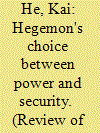

|
|
|
|
|
| Publication |
2010.
|
| Summary/Abstract |
After the Cold War, US strategists have suggested four strategies for the hegemon: hegemonic dominion, selective engagement, offshore balancing, and multilateralism. Rather than debating which strategy is the best for the US at all times, this article focuses on examining which policy is more likely to be chosen by the hegemon - the US - under different strategic conditions. Through a neoclassical realist argument - the power-perception hegemonic model, I argue that US foreign policy depends on how US policymakers perceive US hegemonic status in the international system. Under rising and stable hegemony, selective engagement and hegemonic dominion are two possible power-maximisation strategies given the weak security constraints from the system. Under declining hegemony, offshore balancing and multilateralism are more likely to be chosen by US policymakers to pursue security because of a resumed security imperative from anarchy. US policy toward Asia after the Cold War is a case study to test the validity of the power-perception hegemonic model. I conclude that US policymakers should prepare for life after Pax-Americana, and early implementation of offshore balancing and multilateralism may facilitate the soft-landing of declining US hegemony.
|
|
|
|
|
|
|
|
|
|
|
|
|
|
|
|
| 13 |
ID:
148083
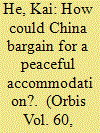

|
|
|
|
|
| Summary/Abstract |
China's rise is a bargaining process between China and the outside world—especially with the United States. This article suggests two strategies, “socialization” and “legitimation,” which a rising power can use to seek “accommodation for identity” with the hegemon. Using China's peaceful rise after the Cold War as a case study, the essay then examines how China employed these two strategies to reach bargaining deals on the arms control regimes and anti-separatist movements in Xinjiang with the outside world. It concludes that the United States needs to take China's bargaining efforts seriously and consider possible peaceful accommodation with China.
|
|
|
|
|
|
|
|
|
|
|
|
|
|
|
|
| 14 |
ID:
082842
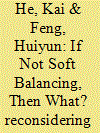

|
|
|
|
|
| Publication |
2008.
|
| Summary/Abstract |
Some scholars argue that soft balancing is a typical state behavior against the hegemon under unipolarity. Others contend that soft balancing against the hegemon is ineffective. We challenge both arguments and suggest that soft balancing is not only a product of specific configurations of the power distribution in the system, unipolarity, but also a rational behavior under another condition, economic dependence. We argue that the interplay between power disparity and economic dependence shapes a state's decision in choosing different balancing strategies. The higher the power disparity and economic dependence, the more likely a state chooses soft balancing to pursue its security. Using U.S. policy toward China after the Cold War as a crucial test, we suggest that the huge power gap and increasing economic interdependence between the United States and China shape U.S. soft balancing rather than hard balancing toward China. We conclude that future U.S.-China relations depend on whether the United States declines as a result of China's rise and on the degree of economic interdependence between the two countries.
|
|
|
|
|
|
|
|
|
|
|
|
|
|
|
|
| 15 |
ID:
083744
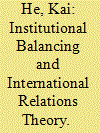

|
|
|
|
|
| Publication |
2008.
|
| Summary/Abstract |
This study integrates elements of neorealist and neoliberal theories with a model of institutional balancing that identifies the conditions under which this form of soft balancing occurs. Institutional balancing, i.e. countering pressures or threats through initiating, utilizing, and dominating multilateral institutions, is a new realist strategy for states to pursue security under anarchy. The interplay between the distribution of capabilities and strong economic interdependence shapes states' decisions on when and how to employ this strategy. Historical examples include: inclusive and exclusive efforts by Third World states and the superpowers to organize voting blocs in the UN during the Cold War; inclusive institutional balancing of ASEAN states to constrain China and ensure US support in the ASEAN Regional Forum (ARF) after the Cold War; exclusive institutional balancing of ASEAN states against the US in the ASEAN Plus Three (APT) summit after the Southeast Asian financial crisis. These examples illustrate the logic of institutional balancing under the conditions of bipolarity, incipient multipolarity, and unipolarity.
|
|
|
|
|
|
|
|
|
|
|
|
|
|
|
|
| 16 |
ID:
176244
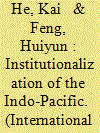

|
|
|
|
|
| Summary/Abstract |
Although the term ‘Indo-Pacific’ has become popular in the foreign policy discourse of some countries, we have yet to see any significant institution-building in the Indo-Pacific region. Borrowing insights from functional institutionalism and political leadership studies of international regimes, we introduce a ‘leadership–institution’ model to explore the problems and prospects of institutionalizing the Indo-Pacific. Through a comparative case study of the institutionalization of the Asia–Pacific vs the Indo-Pacific, we argue that two crucial factors contributed to the slow institutionalization of the Indo-Pacific as a regional system in world politics: the lack of ideational leadership from an epistemic community and the weak executive leadership from a powerful state. While ideational leaders can help states identify and expand common interests in cooperation, executive leadership will facilitate states to overcome operational obstacles in cooperation, such as the ‘collective action’ problem and the ‘relative gains’ concern. The future of institution-building in the Indo-Pacific will depend on whether and how these two leadership roles are played by scholars and states in the region. In the conclusion, we discuss the challenges of institutionalizing the Indo-Pacific and highlight China as a wild card in the future of Indo-Pacific regionalism.
|
|
|
|
|
|
|
|
|
|
|
|
|
|
|
|
| 17 |
ID:
091431
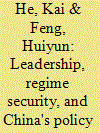

|
|
|
|
|
| Publication |
2009.
|
| Summary/Abstract |
Traditional analyses of Taiwan crises have relied mainly on deterrence theory for their explanatory power. This approach fails to account for China's risk-taking behavior, which can be explained by prospect theory. We suggest that Chinese leaders are more likely to use more risky military coercion against Taiwan's pro-independence movements within a domain of losses, i.e., when their regime faces serious domestic and international challenges to its security. Conversely, Chinese leaders are more likely to employ less risky political pressure to oppose Taiwan's pro-independence forces if their decision making takes place in a domain of gains, i.e., when the security of China's regime is not challenged. We conclude that maintaining a good US-China relationship is the best strategy for the United States to help prevent military crises in the Taiwan Strait.
|
|
|
|
|
|
|
|
|
|
|
|
|
|
|
|
| 18 |
ID:
085303
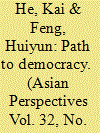

|
|
|
|
|
| Publication |
2008.
|
| Summary/Abstract |
China's transition is drawing worldwide attention. China started market economic reforms in 1978 and is rapidly closing its economic gap with the developed world. The Chinese public and Chinese leaders have started to debate and explore where China should go politically and how to get there. After examining the merits and weaknesses of four prevailing theories of democratization-modernization, social mobilization, cultural/social capital, and negotiation-pact transition theory-we conclude with an appropriate model for China's political future. We argue that (1) the conflict between the reform and conservative groups inside the communist regime will shape the process of China's democratization; (2) the hope of China's political future lies in continued economic development, a mature civil society, and the building of democratic political culture in society; and (3) the current intra-party democracy promoted by Hu and Wen signals a positive trend for China's future democratization.
|
|
|
|
|
|
|
|
|
|
|
|
|
|
|
|
| 19 |
ID:
143152


|
|
|
|
|
| Summary/Abstract |
ALONG WITH CHINA'S RISE IN MILITARY and economic capabilities, foreign policy crises involving China seem more likely, as seen in the diplomatic standoffs in the South China Sea and over the Diaoyu/Senkaku Islands. With the United States “rebalancing toward Asia,” diplomatic and military crises between China and its neighbors will inevitably involve U.S. interests in the Asia-Pacific.1 Therefore, it is imperative for policymakers in the United States and other nations to understand China's dynamic behavior in foreign policy crises—that is, when China will take risks to escalate a crisis and when China will avoid risks to seek accommodation during a crisis.
|
|
|
|
|
|
|
|
|
|
|
|
|
|
|
|
| 20 |
ID:
184951
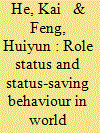

|
|
|
|
|
| Summary/Abstract |
Most research on status in international politics focuses on a state's ‘trait status’, defined by valued attributes that a state possesses, but ignores the importance of ‘role status’, which is constituted through state interactions and competent practices in world politics. By integrating prospect theory and role status scholarship, this article introduces a ‘status-saving’ argument to shed light on how states adopt risk-acceptant strategies to salvage the decline in their role status in world politics. We test the status-saving argument by examining the ASEAN states’ bold community-building efforts in the early 2000s, especially the adoption of the ASEAN Charter in 2007. We argue that both the economic and political conditions of ASEAN were far from mature enough to pursue such an institutionalization and legalization endeavour. The perceived decline of international role status after the 1998 Asian financial crisis, however, encouraged the ASEAN states to take this ‘great leap forward’ behaviour towards regional integration, which has placed ASEAN's long-term status and internal unity in a more risky and vulnerable position. We conclude that pursuing role status is another way for states, especially rising powers, to seek status in a deference hierarchy. Dominant powers should consider accommodating the pursuit of role status by rising powers and encourage ‘do-goodism’ in world politics.
|
|
|
|
|
|
|
|
|
|
|
|
|
|
|
|
|
|
|
|
|